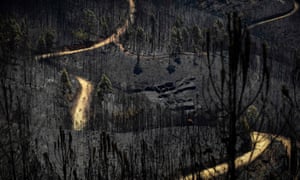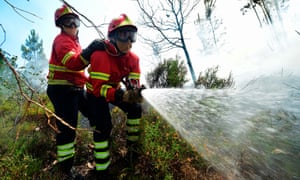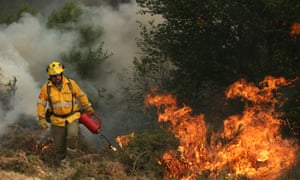Wildfires
that killed 64 people in Portugal have been brought under control,
firefighters have said, as the government insisted it was still too
early to say whether the disaster could have been handled better.
Portugal’s worst forest fire broke out on Saturday in the central municipality of Pedrógão Grande before spreading to neighbouring areas including Góis, Pampilhosa da Serra and Arganil.
Many of those who died were killed in their cars as they tried to flee the flames, which also injured more than 250 people.
The fire in Pedrógão Grande, which ravaged 30,000 hectares (74,000 acres) of forest, was only doused late on Wednesday after firefighters contended with searing heat and rapidly shifting winds.
“Higher humidity levels and lower temperatures allowed the firefighters to contain the fire and extinguish the remaining hotspots which had briefly broken out,” Antonio Ribeiro, who led the Pedrógão operations, said on Thursday.
The blaze in Góis, the second biggest after Pedrógão Grande, was
brought under control on Thursday, although officials said some fires
could break out again.
Both the government and the emergency services have been criticised over their response to the fires, but the Portuguese interior minister, Constança Urbano de Sousa, said it would be premature to talk about possible state failings while the fires were still burning.

Portugal’s worst forest fire broke out on Saturday in the central municipality of Pedrógão Grande before spreading to neighbouring areas including Góis, Pampilhosa da Serra and Arganil.
Many of those who died were killed in their cars as they tried to flee the flames, which also injured more than 250 people.
The fire in Pedrógão Grande, which ravaged 30,000 hectares (74,000 acres) of forest, was only doused late on Wednesday after firefighters contended with searing heat and rapidly shifting winds.
“Higher humidity levels and lower temperatures allowed the firefighters to contain the fire and extinguish the remaining hotspots which had briefly broken out,” Antonio Ribeiro, who led the Pedrógão operations, said on Thursday.
Both the government and the emergency services have been criticised over their response to the fires, but the Portuguese interior minister, Constança Urbano de Sousa, said it would be premature to talk about possible state failings while the fires were still burning.

“At the moment we can’t say for sure whether the catastrophic consequences of this fire could have been prevented,” she told the state broadcaster RTP. “It’s the kind of natural disaster that is caused by many factors.”
Portugal’s prime minister, António Costa, has asked the head of the National Republican Guard (GNR) why officers did not close the road where many of the victims burned to death.
He also asked for clarification on the extent to which rescuers’ communications systems had been affected by the fire, and for more information on whether the high death toll was the result of unusual weather or problems with the response.
“Why, for how long and what impact was there on the planning, command and execution of operations if your very systems were not working? What was done to establish alternative connections?” Costa asked of the emergency services, according to the state news agency Lusa.
A day earlier, he said early efforts to alert the public had been hindered after the flames destroyed phone lines and communications towers, but insisted that “nothing compromised the firefighting efforts”.

The Portuguese weather agency IPMA said in an initial report that the fire had spread so quickly because of exceptional conditions.
The agency blamed the dynamics of the wildfire itself and atmospheric instability, which created a “downburst” – an unusually strong wind that blows down towards the ground and sprays embers across a broad area.
The IPMA report was posted on the government’s website late on Wednesday along with another report from the GNR, a paramilitary police force that patrols rural areas.
Responding to questions about why the EN 236-1 road where 47 deaths occurred was not closed, the GNR report said its officers had “no indication or information” of risk there.
In an apparent reference to problems with radio and mobile phone links, it said there had been “difficulties with [all] communications” at the time.
It added that both “freakish” weather conditions and the rapid pace of the fire took everyone by surprise.
Wildfires kill dozens in central Portugal
But Jaime Marta Soares, president of the League of Firefighters, said he believed arson was to blame, telling local media the fire had already been burning for two hours before the storm started on Saturday.
“I believe, until there is evidence to the contrary … that the fire was of criminal origin,” he said.

No comments:
Post a Comment